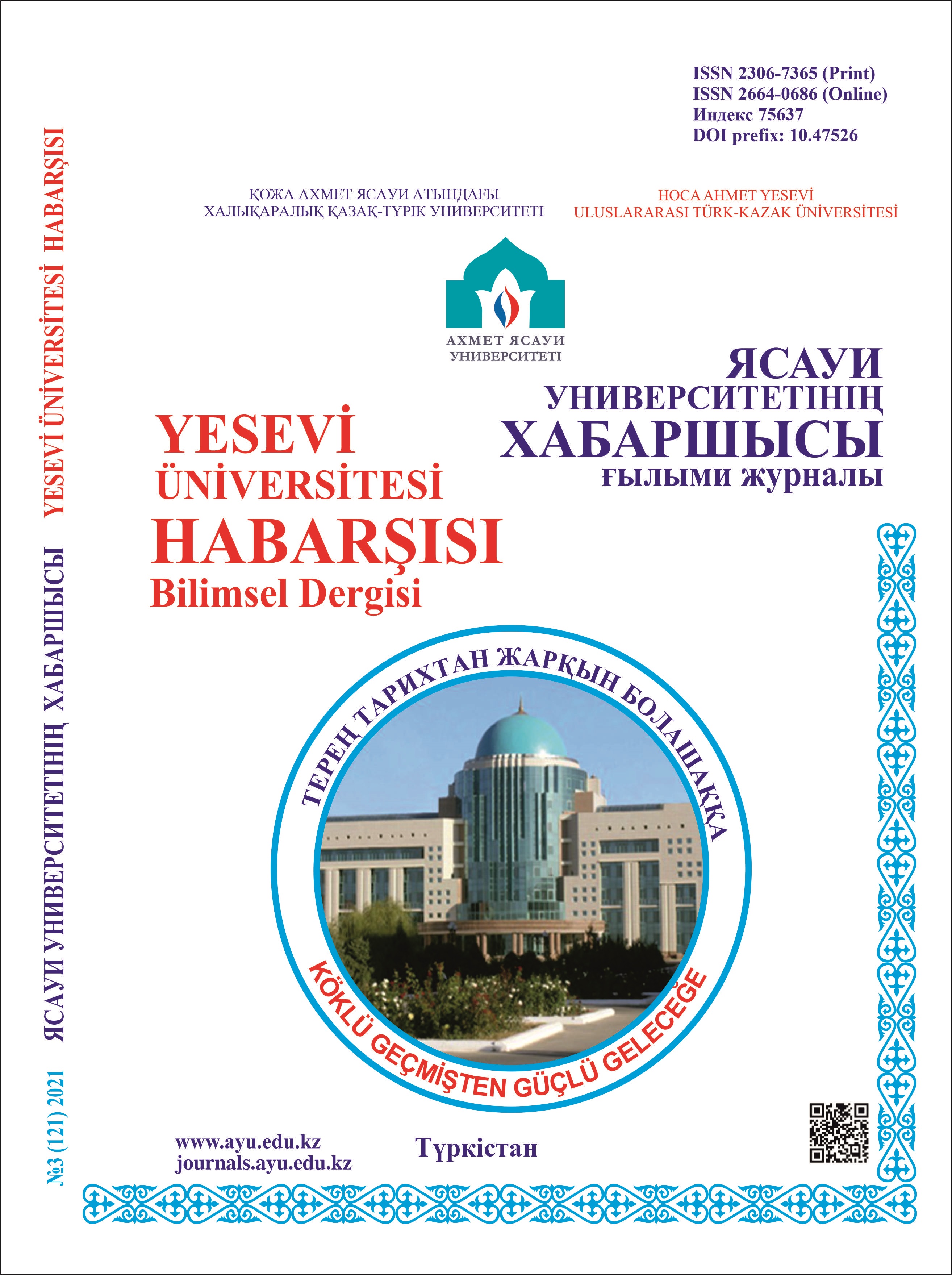Pedagogical Analysis of the Application of the Methodology of Distance Learning Biology
Keywords:
distance learning in biology, information communication technologies, digital information resources, pedagogical technologies, online platform, asynchronous learning.Abstract
This article examines one of the current problems arising in the demands of modern society – the use of distance learning in the process of teaching biology.
Theoretical and empirical research using information and communication technologies was conducted with the participation of teachers and students of the 10th grade of Kyzyl Asker secondary school in Turkestan region. In the course of research innovative methods of distance learning were used: “individual learning”, “teacher-student”, “student-student”, case method, chat-lesson-chat-technology, “flipped classroom”, interviews (via Zoom platform), computer statistics, interpretation of computer graphic tables, etc. Conducting experiments in a virtual laboratory, extensive use of test programs in assessing learning outcomes has increased scientific cognition and the interest of students.
By analyzing the data collected as a result of the research, effective platforms were selected, and methods for teaching biology were developed and proposed, allowing students to easily master the distance learning format. Distance technologies allowed students to deeply master basic biological concepts and form special competencies through algorithm, formulation, selection, analysis, evaluation, systematization, generalization using information technology in the course of the lesson and its consolidation of the lesson.
The results of this research will be used to improve the effectiveness of teaching biology in the future.
References
Гурьев С.В. Современное дистанционное обучение: монография. – М.: РУСАЙНС, 2018. – 118 с.
Крайнова О.А. Технологии дистанционного обучения: учебно-методическое пособие. – Тольятти: Изд-во ТГУ, 2014. – 125 с.
Роберт И.В. Теория и методика информатизации образования (психолого-педагогический и технологический аспекты). – Москва: БИНОМ. Лаборатория знаний, 2014. – 398 с.
Мовчан И.Н. Цифровые образовательные ресурсы: современные возможности и тенденции развития // Сборник научных трудов по материалам международной науч.-практич. конф. – М.: ООО Научный мир, 2010. – С. 36–38.
Fleming N. Teaching and learning styles // Open Journal of Social Sciences. – 2001. – №7(8). – P. 139–141.
Акбутаева Л.Б., Агибаева А.К. Қазіргі мектептерде онлайн білім берудің ерекшеліктері // «Жаратылыстану ғылымдарының қазіргі заманғы келелі мәселелері және пәнаралық зерттеулер» атты Халықаралық ғылыми-теориялық конференция материалдарының жинағы. – Атырау: Х. Досмұхамедов атындағы Атырау университеті, 2021. – Б. 139–143.
Дүйсенбаева Р.Д., Туретаева Г.І. Ақпараттық технологиялар арқылы мүмкіндігі шектеулі балаларға түзету пәндерін оқыту // «GLOBAL SCIENCE AND INNOVATIONS 2019: CENTRAL ASIA» атты VI Халықаралық ғылыми-тәжірибелік конференция материалдары. – Нұр-Сұлтан, 2019. – Б. 294–298.
Смирнов В.А. Научно-методические основы формирования системы обучения биологии в открытом информационном обществе: Автореф. ... канд. пед. наук. – Санкт-Петербург, 2000. – 22 c.
Issayev G.I. Application Of Electronic Educational Resources In Biology Courses: monograph. – Shymkent: «Nurly Beine», 2019. – 103 p.
Amantayeva A., Karbayeva S., Childibayev Z., Turlybekova G., Issayev G., Stankevich P. Forming environmental competence in future biology teachers through project tasks. // Cypriot Journal of Educational Science. – 2022. – №17(2). – P. 664–675.
REFERENCES
Guriev S.V. Sovremennoe distancionnoe obuchenie: monografia [Modern distance learning: monograph]. – M.: RUSAINS, 2018. – 118 s. [in Russian]
Krainova O.A. Tehnologii distancionnogo obucheniya [Distance learning technologies]: uchebno-metodicheskoe posobie. – Tolyatti: Izd-vo TGU, 2014. – 125 s. [in Russian]
Robert I.V. Teoriia i metodika informatizacii obrazovaniia (psihologo-pedagogicheskiy i tehnologicheskiy aspekty) [Theory and methodology of informatization of education (psychological, pedagogical and technological aspects)]. – M.: BINOM. Laboratoriia znaniy, 2014. – 398 s. [in Russian]
Movchan I.N. Cifrovye obrazovatelnye resursy: sovremennye vozmojnosti i tendencii razvitiia // Sbornik nauchnyh trudov po materialam mejdunarodnoi nauch.-praktich. konf. – M.: OOO Nauchnyi mir, 2010. – S. 36–38. [in Russian]
Fleming N. Teaching and learning styles // Open Journal of Social Sciences. – 2001. – №7(8). – P. 139–141.
Akbуtaeva L.B., Agıbaeva A.K. Qazirgi mektepterde onlaın bilim berуdin erekshelikteri [Features of online education in modern schools] // «Jaratylystany gylymdarynyn qazirgi zamangy keleli maseleleri jane panaralyq zertteuler» atty Halyqaralyq gylymi-teoriyalyq konferenciia materialdarynyn jinagy. – Atyray: H. Dosmuhamedov atyndagy Atyray universiteti, 2021. – B. 139–143. [in Kazakh]
Duisenbaeva R.D., Turetaeva G.I. Aqparattyq tehnologialar arqyly mumkindigi shekteuli balalarga tuzety panderin oqyty [Teaching correctional subjects to children with disabilities through information technology] // «GLOBAL SCIENCE AND INNOVATIONS 2019: CENTRAL ASIA» atty VI Halyqaralyq gylymı-tajiribelik konferensiia materialdary. – Nur-Sultan, 2019. – B. 294–298. [in Kazakh]
Smirnov V.A. Nauchno-metodicheskie osnovi formirovaniia sistemy obucheniia biologii v otkrytom informacionnom obshestve [Scientific-methodical bases of formation of systems of teaching biology in open information society]: Avtoref. ... kand. ped. nauk. – Sankt-Peterburg, 2000. – 22 s. [in Russian]
Issayev G.I. Application Of Electronic Educational Resources In Biology Courses: monograph. – Shymkent: «Nurly Beine», 2019. – 103 p.
Amantayeva A., Karbayeva S., Childibayev Z., Turlybekova G., Issayev G., Stankevich P. Forming environmental competence in future biology teachers through project tasks // Cypriot Journal of Educational Science. – 2022. – №17(2). – P. 664–675.

